#THE THING IS THAT IT WORKS
Explore tagged Tumblr posts
Text

This is why i shouldn't be allowed to write at 4 in the morning what was this metaphor
#THE THING IS THAT IT WORKS#spiders often get cannibalised after mating#but not all the time#he can still tread carefully so he doesn't end up on a plate. He's not a fly on the web. He's another spider on a web of two#He's still fucked though. but at least he has the allusion of safety. somewhat#the heam writes#The question is why was i thinking of spider metaphors at 4 in the mornin
2 notes
·
View notes
Text
“…to me” is one of the most powerful disclaimers we have on here… is this character analysis accurate? debatable. but it’s real… to me.
#honestly i have never read character analysis that i felt was 100% accurate#and it shouldn’t be#it’s a transformative creative work in and of itself based on the viewer’s subjective experience with the work#To Me is especially useful for less serious things#like. this random song applies to this extremely specific and emotionally fraught situation… To Me 😌😌#you know how it is
48K notes
·
View notes
Text
crazy how 4 hours of work will literally take up my entire 15+ hour day. who allowed this
#text#i have Things to Do tomorrow but i also have Work and it feels impossible to do both#even though mathematically i should be literally fine
87K notes
·
View notes
Text
please i love you i'm begging you bring back suspension of disbelief bring back trusting the audience like. i cannot handle any more dialogue that sounds like a legal document. "hello, i am here to talk to you about the incident from a few minutes ago, because i feel you might be unwell, and i am invested in your personal wellbeing." "thank you, i am unwell because the incident was hurtful to me due to my childhood, which was bad." I CANT!!!!
do you know how many people are mad that authors use "growled" as a word for "said"? it's just poetics! they do not literally mean "growled," it's just a common replacement for "said with force but in a low tone." it's normal! do you hear me!! help me i love you please let me out of here!!!
#i am so sick of writers having to anticipate the most boring#bad-faith readings of their work. i am like - if you use cheese as a currency#okay! as long as the world makes sense to me: cool. cheese tax. moving on.#my job as the reader is to suspend my disbelief and say okay! i am so sick of like#fanfiction authors having to write dissertations#because they had an interesting idea they'd like to try out!!!#just write it! if it doesn't make sense that's someone else's problem!!!#PS OP is autistic. yes sometimes i take things literally at first glance. then i think about it lol#this is so clearly not about accessibility etc. it's about like. girl even i an autistic person#am able to understand ''they probably didn't mean his eyes darkened LITERALLY''
81K notes
·
View notes
Text
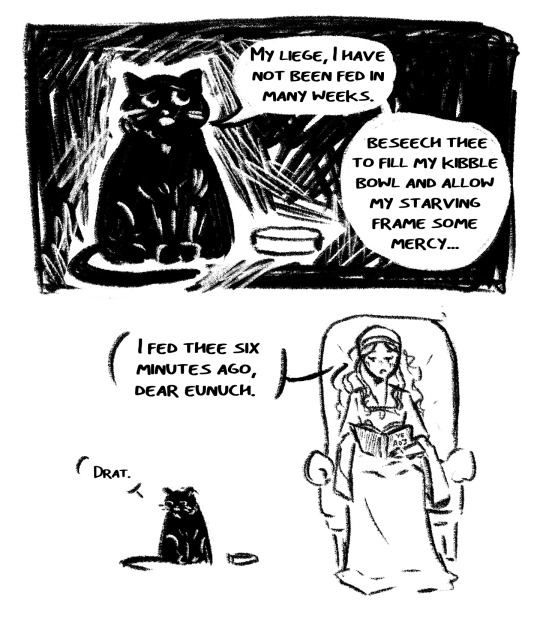
i love my cat but he is very fond of trickery
#cats#lady normalgirl and her eunuch#i think the name’s gonna stick i was talking to my friend (who we joke is my tumblr manager)#and apparently one of the first things i said when we met (abt 3 years ago) was “im a normal girl” so. lady normalgirl works LOL#10k#20k#my doods#30k
30K notes
·
View notes
Text



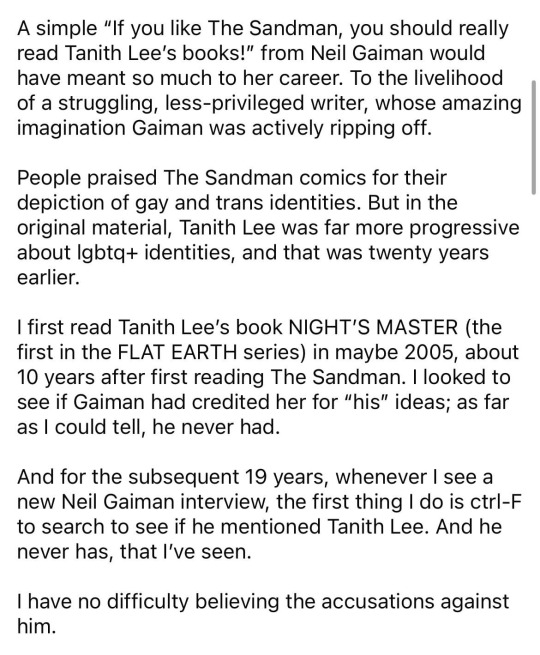
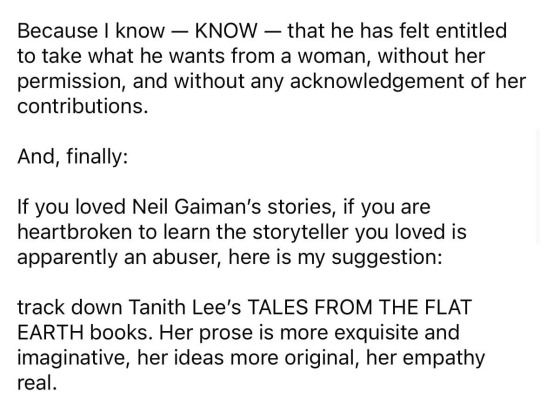
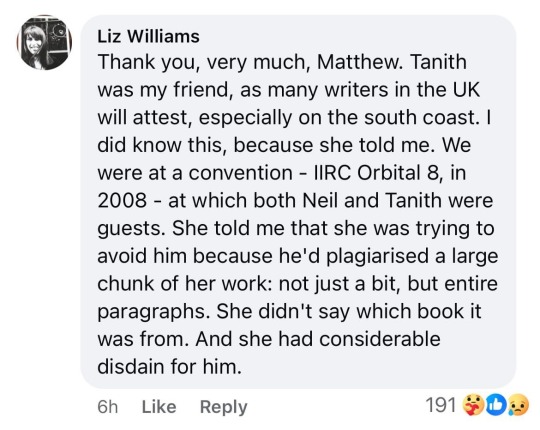

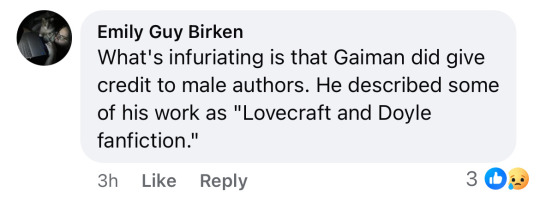
Shared here today by Matthew Boroson on Facebook. (ETA: Gaining inspiration from other authors is great. Lifting passages and avoiding giving credit isn’t.)
Tanith Lee was the first woman to win the British Fantasy Award for best novel, for the second book of the Flat Earth series. She died in 2015. You can buy Tales From the Flat Earth here and here .
#neil gaiman#tanith lee#I had no idea#this has made me even angrier#and also clarifies a few more things for me#anyway I thought you’d want to know#eta: inspiration is not plagiarism — the problem is not that he was inspired by other works#most good authors are#the problem is lifting passages#and the other problem is not crediting inspiration where it’s clearly due
34K notes
·
View notes
Text

only you.
#I still cannot fathom that the jayvik ending we got is real#I'm still convinced I will wake up from a dream#Every tiny thing about it was absolutely perfect#and I applaud everyone who worked on it#so all I really wanted to add was a little kiss#in honour of this incredibly beautiful scene#jayvik intertwined their souls and will now spend eternity together#jesus christ#get a room you two#arcane#arcane fanart#jayvik#jayvik fanart#jayce#viktor#jayce and viktor#my art#fanart
52K notes
·
View notes
Text


In a fantasy setting, my job would be exactly the same
#dragonsona#dragon#tech support#myart#this is a real thing that happens in my real job#people lose their work laptops... with a sticky note attached that has their work username+password on it#drives me up the wall#these people have access to some pretty sensitive information!
22K notes
·
View notes
Text


i think mabel somehow finds a picture of stan and ford's prom outfits and goes ham recreating the suits for her and dipper's prom
#gravity falls#gf#dipper pines#mabel pines#standford pines#stanley pines#i actually hyperfixated on gf two years ago and tried to execute this concept then#but couldn't get it to look the way i wanted#and here i am two years later#hyperfixated again#and finally finishing this drawing#funny how things work out
23K notes
·
View notes
Text
shaking my head while playing neko atsume so people know that I don’t support outdoor cats
#I heard they made neko atsume 2 and I couldn’t decide which I wanted so I downloaded both#the nice thing is that 1 comes with a watch app so I can easily check if there are new cats without pulling out my phone#great for when I go to pee at work and realize I left my phone but still wanna procrastinate#but 2 you can visit other people’s yards???
19K notes
·
View notes
Text
I must sleep. Sleep is the mind-healer. Sleep is the big-life that brings total ability to fucking do anything. I will face my bed. I will permit the blankie to pass over me and snores to pass through me. And when sleep has gone past I will turn the outer eye to greet the new morning. When the sleep has gone there will be everything. Energy and will to live will remain.
#having a come to Jesus with myself about trying to work late#sleep is the only path to productivity. rest is the only thing that lets me get things done.#litany against not laying down#2024
89K notes
·
View notes
Text
Planet's Fucked: What Can You Do To Help? (Long Post)
Since nobody is talking about the existential threat to the climate and the environment a second Trump term/Republican government control will cause, which to me supersedes literally every other issue, I wanted to just say my two cents, and some things you can do to help. I am a conservation biologist, whose field was hit substantially by the first Trump presidency. I study wild bees, birds, and plants.
In case anyone forgot what he did last time, he gagged scientists' ability to talk about climate change, he tried zeroing budgets for agencies like the NOAA, he attempted to gut protections in the Endangered Species Act (mainly by redefining 'take' in a way that would allow corporations to destroy habitat of imperiled species with no ramifications), he tried to do the same for the Migratory Bird Treaty Act (the law that offers official protection for native non-game birds), he sought to expand oil and coal extraction from federal protected lands, he shrunk the size of multiple national preserves, HE PULLED US OUT OF THE PARIS CLIMATE AGREEMENT, and more.
We are at a crucial tipping point in being able to slow the pace of climate change, where we decide what emissions scenario we will operate at, with existential consequences for both the environment and people. We are also in the middle of the Sixth Mass Extinction, with the rate of species extinctions far surpassing background rates due completely to human actions. What we do now will determine the fate of the environment for hundreds or thousands of years - from our ability to grow key food crops (goodbye corn belt! I hated you anyway but), to the pressure on coastal communities that will face the brunt of sea level rise and intensifying extreme weather events, to desertification, ocean acidification, wildfires, melting permafrost (yay, outbreaks of deadly frozen viruses!), and a breaking down of ecosystems and ecosystem services due to continued habitat loss and species declines, especially insect declines. The fact that the environment is clearly a low priority issue despite the very real existential threat to so many people, is beyond my ability to understand. I do partly blame the public education system for offering no mandatory environmental science curriculum or any at all in most places. What it means is that it will take the support of everyone who does care to make any amount of difference in this steeply uphill battle.
There are not enough environmental scientists to solve these issues, not if public support is not on our side and the majority of the general public is either uninformed or actively hostile towards climate science (or any conservation science).
So what can you, my fellow Americans, do to help mitigate and minimize the inevitable damage that lay ahead?
I'm not going to tell you to recycle more or take shorter showers. I'll be honest, that stuff is a drop in the bucket. What does matter on the individual level is restoring and protecting habitat, reducing threats to at-risk species, reducing pesticide use, improving agricultural practices, and pushing for policy changes. Restoring CONNECTIVITY to our landscape - corridors of contiguous habitat - will make all the difference for wildlife to be able to survive a changing climate and continued human population expansion.
**Caveat that I work in the northeast with pollinators and birds so I cannot provide specific organizations for some topics, including climate change focused NGOs. Scientists on tumblr who specialize in other fields, please add your own recommended resources. **
We need two things: FUNDING and MANPOWER.
You may surprised to find that an insane amount of conservation work is carried out by volunteers. We don't ever have the funds to pay most of the people who want to help. If you really really care, consider going into a conservation-related field as a career. It's rewarding, passionate work.
At the national level, please support:
The Nature Conservancy
Xerces Society for Invertebrate Conservation
Cornell Lab of Ornithology (including eBird)
National Audubon Society
Federal Duck Stamps (you don't need to be a hunter to buy one!)
These first four work to acquire and restore critical habitat, change environmental policy, and educate the public. There is almost certainly a Nature Conservancy-owned property within driving distance of you. Xerces plays a very large role in pollinator conservation, including sustainable agriculture, native bee monitoring programs, and the Bee City/Bee Campus USA programs. The Lab of O is one of the world's leaders in bird research and conservation. Audubon focuses on bird conservation. You can get annual memberships to these organizations and receive cool swag and/or a subscription to their publications which are well worth it. You can also volunteer your time; we need thousands of volunteers to do everything from conducting wildlife surveys, invasive species removal, providing outreach programming, managing habitat/clearing trails, planting trees, you name it. Federal Duck Stamps are the major revenue for wetland conservation; hunters need to buy them to hunt waterfowl but anyone can get them to collect!
THERE ARE DEFINITELY MORE, but these are a start.
Additionally, any federal or local organizations that seek to provide support and relief to those affected by hurricanes, sea level rise, any form of coastal climate change...
At the regional level:
These are a list of topics that affect major regions of the United States. Since I do not work in most of these areas I don't feel confident recommending specific organizations, but please seek resources relating to these as they are likely major conservation issues near you.
PRAIRIE CONSERVATION & PRAIRIE POTHOLE WETLANDS
DRYING OF THE COLORADO RIVER (good overview video linked)
PROTECTION OF ESTUARIES AND SALTMARSH, ESPECIALLY IN THE DELAWARE BAY AND LONG ISLAND (and mangroves further south, everglades etc; this includes restoring LIVING SHORELINES instead of concrete storm walls; also check out the likely-soon extinction of saltmarsh sparrows)
UNDAMMING MAJOR RIVERS (not just the Colorado; restoring salmon runs, restoring historic floodplains)
NATIVE POLLINATOR DECLINES (NOT honeybees. for fuck's sake. honeybees are non-native domesticated animals. don't you DARE get honeybee hives to 'save the bees')
WILDLIFE ALONG THE SOUTHERN BORDER (support the Mission Butterfly Center!)
INVASIVE PLANT AND ANIMAL SPECIES (this is everywhere but the specifics will differ regionally, dear lord please help Hawaii)
LOSS OF WETLANDS NATIONWIDE (some states have lost over 90% of their wetlands, I'm looking at you California, Ohio, Illinois)
INDUSTRIAL AGRICULTURE, esp in the CORN BELT and CALIFORNIA - this is an issue much bigger than each of us, but we can work incrementally to promote sustainable practices and create habitat in farmland-dominated areas. Support small, local farms, especially those that use soil regenerative practices, no-till agriculture, no pesticides/Integrated Pest Management/no neonicotinoids/at least non-persistent pesticides. We need more farmers enrolling in NRCS programs to put farmland in temporary or permanent wetland easements, or to rent the land for a 30-year solar farm cycle. We've lost over 99% of our prairies to corn and soybeans. Let's not make it 100%.
INDIGENOUS LAND-BACK EFFORTS/INDIGENOUS LAND MANAGEMENT/TEK (adding this because there have been increasing efforts not just for reparations but to also allow indigenous communities to steward and manage lands either fully independently or alongside western science, and it would have great benefits for both people and the land; I know others on here could speak much more on this. Please platform indigenous voices)
HARMFUL ALGAL BLOOMS (get your neighbors to stop dumping fertilizers on their lawn next to lakes, reduce agricultural runoff)
OCEAN PLASTIC (it's not straws, it's mostly commercial fishing line/trawling equipment and microplastics)
A lot of these are interconnected. And of course not a complete list.
At the state and local level:
You probably have the most power to make change at the local level!
Support or volunteer at your local nature centers, local/state land conservancy non-profits (find out who owns&manages the preserves you like to hike at!), state fish & game dept/non-game program, local Audubon chapters (they do a LOT). Participate in a Christmas Bird Count!
Join local garden clubs, which install and maintain town plantings - encourage them to use NATIVE plants. Join a community garden!
Get your college campus or city/town certified in the Bee Campus USA/Bee City USA programs from the Xerces Society
Check out your state's official plant nursery, forest society, natural heritage program, anything that you could become a member of, get plants from, or volunteer at.
Volunteer to be part of your town's conservation commission, which makes decisions about land management and funding
Attend classes or volunteer with your land grant university's cooperative extension (including master gardener programs)
Literally any volunteer effort aimed at improving the local environment, whether that's picking up litter, pulling invasive plants, installing a local garden, planting trees in a city park, ANYTHING. make a positive change in your own sphere. learn the local issues affecting your nearby ecosystems. I guarantee some lake or river nearby is polluted
MAKE HABITAT IN YOUR COMMUNITY. Biggest thing you can do. Use plants native to your area in your yard or garden. Ditch your lawn. Don't use pesticides (including mosquito spraying, tick spraying, Roundup, etc). Don't use fertilizers that will run off into drinking water. Leave the leaves in your yard. Get your school/college to plant native gardens. Plant native trees (most trees planted in yards are not native). Remove invasive plants in your yard.
On this last point, HERE ARE EASY ONLINE RESOURCES TO FIND NATIVE PLANTS and LEARN ABOUT NATIVE GARDENING:
Xerces Society Pollinator Conservation Resource Center
Pollinator Pathway
Audubon Native Plant Finder
Homegrown National Park (and Doug Tallamy's other books)
National Wildlife Federation Native Plant Finder (clunky but somewhat helpful)
Heather Holm (for prairie/midwest/northeast)
MonarchGard w/ Benjamin Vogt (for prairie/midwest)
Native Plant Trust (northeast & mid-atlantic)
Grow Native Massachusetts (northeast)
Habitat Gardening in Central New York (northeast)
There are many more - I'm not familiar with resources for western states. Print books are your biggest friend. Happy to provide a list of those.
Lastly, you can help scientists monitor species using citizen science. Contribute to iNaturalist, eBird, Bumblebee Watch, or any number of more geographically or taxonomically targeted programs (for instance, our state has a butterfly census carried out by citizen volunteers).
In short? Get curious, get educated, get involved. Notice your local nature, find out how it's threatened, and find out who's working to protect it that you can help with. The health of the planet, including our resilience to climate change, is determined by small local efforts to maintain and restore habitat. That is how we survive this. When government funding won't come, when we're beat back at every turn trying to get policy changed, it comes down to each individual person creating a safe refuge for nature.
Thanks for reading this far. Please feel free to add your own credible resources and organizations.
#us election#climate change#united states election#resources#native plants#this took 3 hours to write so maybe don't let it flop? i know i write long posts. i know i follow scientists on here#that study birds and corals and other creatures#i realize i did not link sources/resources for everything. i encourage those more qualified to add things on. i need to go to work
18K notes
·
View notes
Text
watching bridgerton and obviously there were a lot of things wrong with the way socializing has worked in the past, but honestly the idea of a "calling hour" is so appealing. office hours for friendship. you can show up unannounced at my home between 1 and 3pm. you must leave by 3pm. I may give you a pastry. lets bring that back
#bridgerton#lauren says things#i know the calling hour is for romantic prospects#(at least in bridgerton)#but there IS something to be said for having social rules! I like it to an extent!#no I don't have a panic disorder rooted in social anxiety why are you asking me that#and tbf one CAN just do this!#but working out social contracts with friends is hard and scary lol
47K notes
·
View notes
Text
One massive, legitimate way to improve as a writer or artist or in any creative endeavor really, is to become absolutely obsessed with something and to allow yourself to be weird about it. Genuinely mean this btw.
#dc comics#disco elysium#shakespeare#hamlet#<- all this things have made me a better#writer and artist for both fan creation#and for my own original work#literal life hack#allow yourself to become obsessive and cringe to a certain degree#birdy chirps
61K notes
·
View notes
Text
fucked up and evil that i Have been drawing and writing all through january but none of you are allowed to see it
#theres uuuh. lotta school work shit#me playing dolls my my character and my friends guy#character designs i need to refine#a commission#hypothetical butch merch designs no one will see until im happy#uhh vmapire au at 16 pages#another weirdly cerebral pash sex thing
8K notes
·
View notes